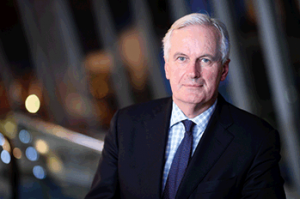Michel Barnier: Keep Calm and Carry On
 He has the patience of a saint – and then some. Former French minister of Foreign Affairs Michel Barnier has the unenviable job of explaining to the British government that Brexit means Brexit – to paraphrase Prime Minister Theresa May who first introduced the combative slogan and has lived to regret it; the words keep bouncing back.
He has the patience of a saint – and then some. Former French minister of Foreign Affairs Michel Barnier has the unenviable job of explaining to the British government that Brexit means Brexit – to paraphrase Prime Minister Theresa May who first introduced the combative slogan and has lived to regret it; the words keep bouncing back.
In July 2016, Mr Barnier was appointed chief negotiator by the European Commission to help steer the United Kingdom towards the exit whilst safeguarding the interests of the remaining 27 EU member states. To this end, Mr Barnier was given a clear but limited set of instructions by the European Council which includes all heads of state and government leaders of the union. He was also charged with maintaining the full transparency of the negotiating process and decline any and all offers to seal backroom deals.
Whilst the commission may perhaps have displayed a slightly greater sensitivity to the feelings of the British – whose love of all things French is particularly understated – Michel Barnier proved, in the end, an excellent choice. The Frenchman has almost singlehandedly redefined the meaning of stoic. Unperturbed by the firestorm kicked up by the tabloids, Mr Barnier refuses to lose his cool, limiting his periodic interventions to curt, yet elegantly worded, dismissals of the latest scheme produced by his counterparts as they seek to fit their square peg into a round hole.
Mr Barnier is not one to bend the rules, engage in flights of fancy, or deviate from the script he was handed. He also remains perfectly calm and carries on – patiently explaining the workings of the European Union to the uninitiated and delineating the playing field set by his mandate and within which the disentanglement of the United Kingdom from the European Union must take shape.
Sometimes, though, keen observers think they may detect a hint of irritation in Mr Barnier’s sporadic utterings such as when he had to explain, yet again, that the militarily useful features of the European navigation system Galileo – a constellation of thirty satellites – is the preserve of member states only as per the agreement that underpins the €10bn undertaking. Ironically, the clause excluding non-members states from accessing the encrypted bits of Galileo – which will feature and estimated position error of less than one centimetre – was, at the time, included at the express insistence of the British.
Mr Barnier would like nothing more than for the United Kingdom to understand that leaving the European Union implies severing all ties to the bloc, including unfettered access to its specialist agencies, markets, and regulatory entities. So far, the Frenchman has discharged his task with considerable aplomb welcoming and appreciating the steps taken by Prime Minister May to infuse the talks with a greater sense of realism.
Born into a Gaullist family and growing up in the Alpine Isère Department next to Grenoble, Michel Barnier graduated from the École Supérieure de Commerce du Paris, one of France’s Grandes Écoles, which only admits the exceptionally bright. Touted as the world’s oldest business school, Mr Barnier, however, choose politics as his trade. He was elected to parliament, age 27, and went on to rise through the ranks. He helped organise the 1992 Winter Olympics in Albertville and, the following year, joined the cabinet of Prime Minister Edouard Balladur before receiving an appointment as Secretary of State for European Affairs.
In Europe, Mr Barnier served as commissioner for Regional Policy between 1999 and 2004, returning to the French cabinet as minister of Foreign Affairs, before again taking up a seat on the European Commission as commissioner for Internal Market and Services (2010-2014). The experience gained in this position now serves Michel Barnier well as he tries to remind his interlocutors of the need to reserve the benefits EU’s single market to member states and associated members who abide by the union’s four freedom – the free movement, of capital, services, goods, and labour.
At times, it seems that Mr Barnier keeps to the maxim first pronounced by the 26th US president Theodore Roosevelt who inhabited the White House between 1901 and 1909: Speak softly and carry a big stick. Mr Barnier knows, more than most, that he need never raise his voice, express frustration, or become irritated for he represents the world’s largest bloc of democratic nations who have – to the surprise of friend and foe – kept a united front despite their differences in the face of the United Kingdom’s likewise democratic decision to exit the European Union. Mr Barnier’s job is to make this happen.
You may have an interest in also reading…
Sir David Frost: Well Done Frostie! Playing Nice in the Quest for the Truth
Earlier this year, Sir David Frost suffered a heart attack while aboard the QE2 and passed away, aged 74. He
Nikolaj Coster-WaLdau: Indomitable
Helping stave off the advance of the White Walkers who threatens the North, Jamie Lannister promises a very satisfying end
Ann Makosinski: A Beautiful Mind
Inventors don’t always make the best entrepreneurs. The skills and attitudes needed to develop new ideas are not the same

















































































